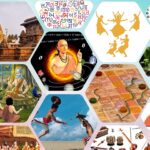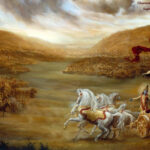Hare Krishna, dear readers!
Continuing from the previous newsletter and in our quest to explore the Indian Knowledge System (IKS) and its intersections with modern science, it is essential to delve into the historical journey of human inquiry. This journey is marked by significant milestones that not only shaped our understanding of the world but also set the stage for philosophical and scientific developments that continue to influence us today.
“Life without enquiry is not worth living for a man.” — Socrates
As we stand at the dawn of the twenty-first century, humanity has witnessed extraordinary achievements in science, from decoding the human genome to the discovery of the Higgs boson and gravitational waves. These milestones affirm our capability to unravel the mysteries of nature. Yet, beneath these successes lies a complex narrative of toil and perseverance in the pursuit of understanding the natural world.
This historical backdrop serves as a foundation for our ongoing exploration of knowledge. As we journey through time, we find that the demarcation of science from non-science or pseudoscience remains a debated issue within the philosophy of science. The dogma of scientism—a belief that only science can provide truth—poses a challenge to the open-minded search for knowledge.
A significant debate persists among scientists, philosophers, and the general public about the nature of science and its boundaries. There is no consensus on what constitutes science, leading some to classify certain areas of knowledge as scientific while others are deemed non-science or pseudoscience. This distinction raises complex issues known as the “demarcation problem” within the philosophy of science.
Many individuals fall into the trap of scientism—a dogmatic view suggesting that science holds the answers to all questions. While this notion is enticing, given the remarkable achievements of prominent thinkers, it undermines the true purpose of science, which is to pursue knowledge with an open mind.
As British mathematician and philosopher of science John Lennox articulates: “For, the statement that only science can lead to truth is not itself deduced from science. It is not a scientific statement but rather a statement about science, that is, it is a meta scientific statement. Therefore, if scientism’s basic principle is true, the statement expressing scientism must be false. Scientism refutes itself. Hence it is incoherent.”
This perspective encourages us to consider the broader scope of inquiry beyond the confines of scientism.
When we begin exploring the historical roadmap of human inquiry, it is essential to consider the geographical perspective as well. Historically, one geography—consisting of European countries—has often acted as the oppressor over other regions. For the past thousand years, India has been an oppressed geography, which hindered the widespread recognition and popularity of the Indian Knowledge System (IKS). It is only natural that the ruling or oppressing class would promote their own worldview to maintain a sense of superiority, as this is crucial for sustaining colonial power. Therefore, when we analyze the history of human inquiry from a Bharatiya or Indian perspective, it is appropriate to divide this roadmap into two categories:
1. Inquiries originating from undivided India, which encompass IKS
2. Other knowledge systems present in the known world
In the journey of the history of human inquiry, the Indian Knowledge System are undoubtedly the oldest treasure trove of knowledge available to humanity. These are so ancient that it becomes nearly impossible for present scientific methods to accurately date them. Let us start the journey with having a cursory look at the corpus of Indian Knowledge System. In the upcoming newsletters we will look at the “Scientific and philosophical inquiries coming from other parts of the known world”

Indian Knowledge System: Corpus and Classification
The term “Indian Knowledge System” is a very generic term denoting any knowledge emanating out of our Indian Subcontinent (Akhanda Bharat). Knowledge has often been categorized based on its geographic origins, leading to the establishment of distinctions such as the Indian Knowledge System and the Western Knowledge System.
This classification has been influenced by historical contexts in which certain forms of knowledge were discarded or demeaned to establish hegemony and supremacy. During the colonial (both Islamic and European) era, the knowledge emanating from Akhanda Bharat (the undivided Indian subcontinent) was systematically marginalized by the ruling colonial powers. This strategic devaluation was aimed at undermining the rich intellectual heritage of India, promoting a narrative that favored Western paradigms while dismissing the valuable contributions of Indian scholarship. As a result, the diverse and profound insights embedded within the Indian Knowledge System have often been overlooked, warranting a renewed appreciation and recognition in contemporary discourse.
With a recorded history of more than 5000 years, the Indian Knowledge System is a treasure trove of knowledge that continues to influence contemporary thought and practice. This profound repository encompasses philosophy, ethics, science, art and spirituality, revealing the continuity of tradition that has been passed down through generations.

Classification of Indian Knowledge System
The above image depicts the classification of IKS. In the next newsletter, we will see these classifications in detail. We will see in detail what 14 Vidyastahana in Sanatana Dharma are. What are the other important sources and contributions of our Rishis.
As we continue to explore the intersection of IKS and modern science, this historical overview serves as a reminder of the rich tapestry of human inquiry. Each step we take in understanding our past enables us to navigate the complexities of the present and the future.
We invite you to reflect on these insights and engage with us in this ongoing exploration of knowledge.
#IKS #IndianKnowledgeSystem #HistoryOfScience #Philosophy #VedicKnowledge #ScientificInquiry
References:



